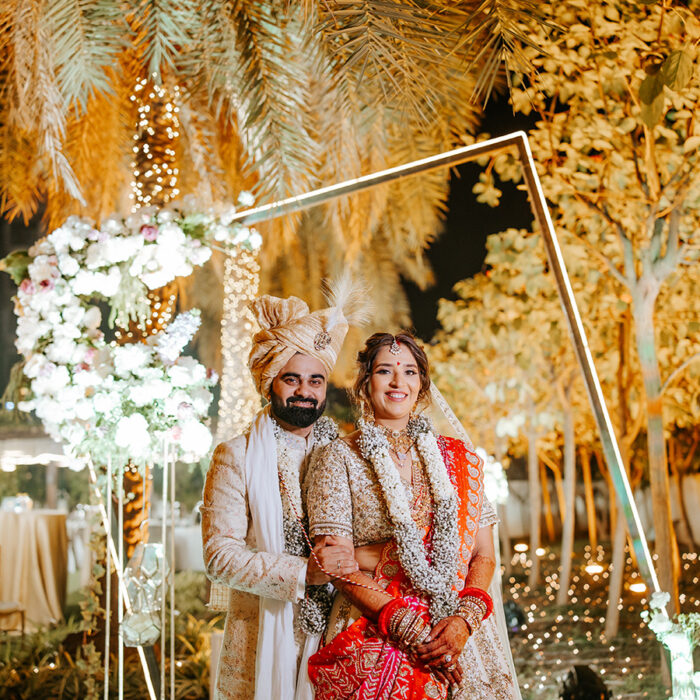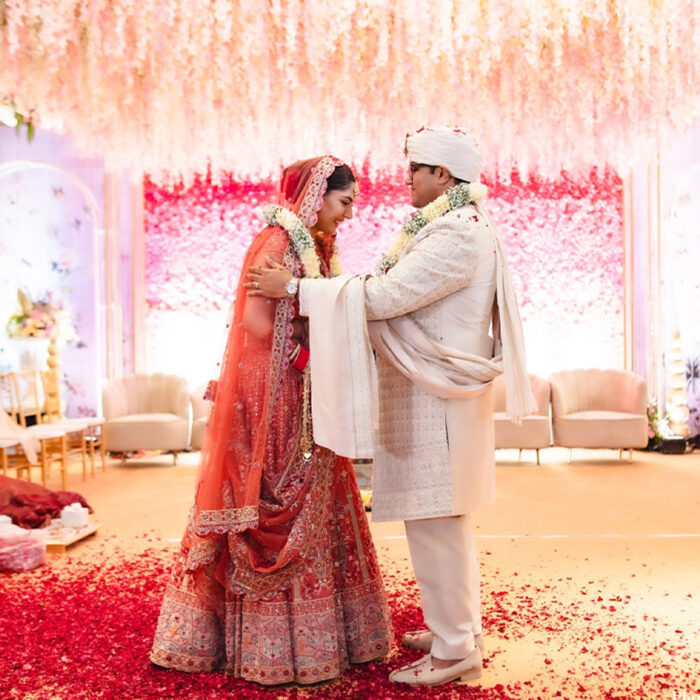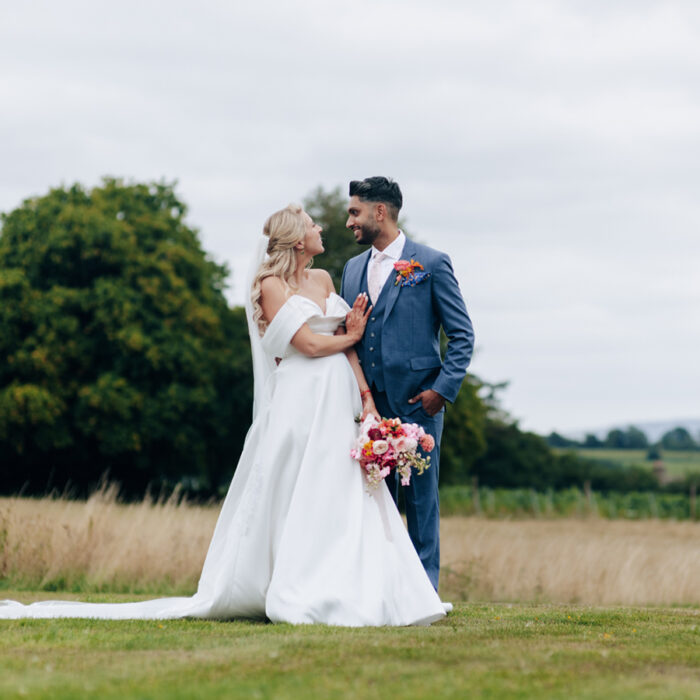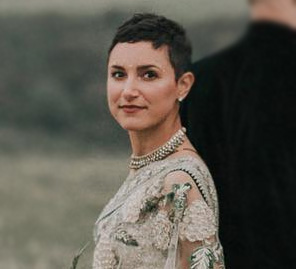Gujarati Weddings: Customs and Traditions
Rituals, customs, style and more! Here's everything you need to know about Gujarati weddings.
Grounded in traditions yet undeniably fun, Gujarati weddings are a perfect portrayal of their colorful culture, warm hospitality and delectable vegetarian cuisine. From twirling bandhani outfits to fun wedding games, and of course, a whole lot of garba, there is never a dull moment. Exploring the colorful traditions of Gujarati nuptials, we bring you this installment of the Wedding Tradition Series which is a kaleidoscopic guide to different regional cultures, spanning rituals, customs, fashion, and more.
As more and more couples from diverse cultures and countries tie the knot, they desire a beautiful blend of memorable celebrations. This Wedding Tradition Series aims to answer all your questions about ceremonies in different Indian cultures and their significance, how to dress for functions, and more. Here, you are invited to step into the vibrant and traditional festivities, fashion and food of gorgeous Gujarati weddings!
Wedding Functions
Chanlo Matli
Once the union between the groom and the bride is finalized, this function kicks off the pre-wedding festivities. ‘Chandlo’ means a dot of vermillion on the forehead. The bride’s father along with four other male members of the family visit the groom’s home to anoint him with the ‘chandlo.’ Gifts or ‘shagun’ are also given to him, and the wedding is fixed.
 Photo Courtesy: The Wedding Salad
Photo Courtesy: The Wedding Salad
Gol Dhana
‘Gol Dhana’ refers to the sweet treat made with jaggery and coriander seeds that is exchanged between the bride and groom’s families at this function which symbolizes an engagement. The bride, along with her family, visits the groom’s home with gifts and sweets, wherein they exchange rings and seek blessings from five married women from both families. The ceremony is followed by a sumptuous traditional meal.
 Photo Courtesy: The Photo Lab
Photo Courtesy: The Photo Lab
 Photo Courtesy: The Photo Lab
Photo Courtesy: The Photo Lab
Lagan Lakhvanu (kankotri)
This ceremony marks the writing of the first official wedding invite called Kankotri, which is offered to god as a token to invite his blessings to grace the wedding. It also seeks his blessings for the couple and for the wedding to be held successfully on the chosen auspicious date. After the completion of this, official invites to guests are sent out. The ceremony traditionally was held a month before the wedding, but varies now as per convenience.
 Photo Courtesy: The Photo Lab
Photo Courtesy: The Photo Lab
 Photo Courtesy: The Photo Lab
Photo Courtesy: The Photo Lab
Mehndi
Generally hosted two days prior to the wedding at the bride’s home, the mehndi is where the women gather for a cheerful function of music and dance as the bride’s hands and feet are covered in beautiful henna designs. The groom’s initials are often incorporated into the design. The rest of the women also get the hands painted with henna.
 Photo Courtesy: KS Creative Photography
Photo Courtesy: KS Creative Photography
Sangeet Sandhya
A night that everyone looks forward to, the sangeet is a night of music and dance held generally a night before the wedding. Both families get together to let loose, sing songs, play dandiya and garba and have a gala time!
 Photo Courtesy: Oragraphy
Photo Courtesy: Oragraphy
 Photo Courtesy: Oragraphy
Photo Courtesy: Oragraphy
Mandap Mahurat
Invoking the blessings of Lord Ganesha before any auspicious occasion is a common practice in Indian/Hindu culture. The bride and groom host a prayer function in their homes respectively and pray to Lord Ganesha, seeking his blessings for a prosperous future with no obstacles. They also pray to Mother Earth to bless the spot where the mandap would be erected.
 Photo Courtesy: The Photo Lab
Photo Courtesy: The Photo Lab
 Photo Courtesy: Oragraphy
Photo Courtesy: Oragraphy
Griha Shanti
Also done in both houses respectively, the ‘Griha Shanti Puja’ is done to ensure a happy and peaceful marital life for the couple.
 Photo Courtesy: Oragraphy
Photo Courtesy: Oragraphy
 Photo Courtesy: Oragraphy
Photo Courtesy: Oragraphy
Pithi
The ‘pithi’ or haldi ceremony is held at the bride’s and groom’s homes separately. They are made to sit on a low stool while their loved ones smear a paste of turmeric, sandalwood, rosewater and other herbs on their face, hands and feet. This paste is prepared traditionally by the bride/ groom’s paternal uncle’s wife or ‘kaki.’ They are then bathed in holy water.
 Photo Courtesy: Saurabh Anjarlekar
Photo Courtesy: Saurabh Anjarlekar
Mameru
Akin to a tradition present in more Indian cultures, a day before the wedding, the bride’s maternal uncle or ‘mama’ and her maternal aunt’s husband called ‘mousa’ visit her home and gift her a traditional Panetar saree, jewellery, ivory ‘chura’ (bangles), sweets, dry fruits and so on. The gifts are beautifully wrapped and presented to the bride.
 Photo Courtesy: House On The Clouds
Photo Courtesy: House On The Clouds
Varghodo
Equivalent to the ‘baraat,’ the groom travels to the bride’s home or the wedding venue on a magnificently decked horse as his relatives dance along with him on the way. Upon reaching, the groom and his family are welcomed by the bride’s mother with sweets and aarti in the ‘jaan’ ritual. In a fun custom, the bride’s mother then lightly pinches the groom’s nose to remind him to be humble since he is there to ask for her daughter’s hand, as he playfully tries to avoid getting caught.
 Photo Courtesy: The Photo Lab
Photo Courtesy: The Photo Lab
Jaimala
The couple exchange beautiful flower garlands as everyone cheers and showers them with petals.
 Photo Courtesy: The Photo Lab
Photo Courtesy: The Photo Lab
Madhuparka
The groom is then led to the mandap by the bride’s mother, where his feet are washed with milk and water and he is fed a holy drink of milk, yogurt, sugar, honey and ghee known as ‘panchamrut.’
 Photo Courtesy: DKreate Photography
Photo Courtesy: DKreate Photography
Antarpaat
The bride is led to the mandap by her maternal uncle, after which a cloth is hung up like a curtain between the bride and groom called the ‘antarpat.’ It is slowly lowered as they gaze upon each other’s faces for the first time.
 Photo Courtesy: Oragraphy
Photo Courtesy: Oragraphy
Kanyadaan
The ‘kanyadaan’ ritual is an important ceremony where the father officially gives his daughter’s hand to the groom. After washing their feet, he asks his future son-in-law to take the responsibility of his daughter’s happiness and wellbeing from them onwards with folded hands.
 Photo Courtesy: The Photo Lab
Photo Courtesy: The Photo Lab
Hasta Milap
After the kanyadaan, the bride’s pallu is tied to the groom’s shawl by the priest as a holy symbol of their union. He also places their hand in each other’s hand and chants mantras as their family showers them with petals and rice grains.
 Photo Courtesy: Romesh Dhamija Productions
Photo Courtesy: Romesh Dhamija Productions
Joota Churai
One of the most fun rituals in Indian weddings, the groom’s shoes are ‘stolen’ by the bride’s sisters for money, creating a lot of merriment.
 Photo Courtesy: Oragraphy
Photo Courtesy: Oragraphy
Pheras
The couple walk around the holy fire as the priest chants from the holy scriptures in the pheras ritual. The brother of the bride hands the couple puffed rice after every circle to offer to the fire.
 Photo Courtesy: Ardour Media
Photo Courtesy: Ardour Media
 Photo Courtesy: The Photo Lab
Photo Courtesy: The Photo Lab
Saptapadi
A crucial ritual in any Hindu wedding, the couple take seven steps together known as the “saptapadi” as they take seven vows of holy matrimony, binding them for eternity.
 Photo Courtesy: The Photo Lab
Photo Courtesy: The Photo Lab
Vidaai
After the completion of the nuptials, the bride takes leave from her home to go to her new home with her husband. The ceremony sees a tearful goodbye and emotional moments, and she throws puffed rice overhead towards her family, which her mother catches in her pallu.
 Photo Courtesy: Dreamcatchers Photography
Photo Courtesy: Dreamcatchers Photography
Ghar ni Laxmi
Translating to ‘the goddess of our home,’ in this ceremony, the bride is seen as a symbol of Laxmi, the goddess of good fortune. She is welcomed fondly to her new home, which she enters by kicking over a small copper vessel of rice as an auspicious symbol.
 Photo Courtesy: Magzter
Photo Courtesy: Magzter
Aeki-Baki
The hectic days unwind with some fun wedding games to truly welcome the bride into the groom’s family. A large bowl is filled with milk and a ring is dropped into it. The bride and groom then compete to see who finds it first.
 Photo Courtesy: The Photo Lab
Photo Courtesy: The Photo Lab
Things You Will See in a Gujarati Wedding
While all Hindu weddings share common cultural and ritual nuances, there are some aspects that speak specifically to Gujarati customs and values.
Dandiya Raas & Garba
High on energy and fun, Dandiya Raas and Garba dancing are the most awaited activities of Gujarati weddings! The twirling lehengas, peppy music and the clinking of dandiya sticks are sure to have wedding guests on their feet for hours at late evenings/nights when these sessions are typically held.
 Photo Courtesy: Ardour Media
Photo Courtesy: Ardour Media
 Photo Courtesy: Sam & Ekta
Photo Courtesy: Sam & Ekta
 Photo Courtesy: Sam & Ekta
Photo Courtesy: Sam & Ekta
Delectable Vegetarian Cuisine
An exquisite blend of flavors and textures, the stunning vegetarian spread at Gujarati weddings is loved by vegetarians and non-vegetarians alike.
 Photo Courtesy: JBM Weddings
Photo Courtesy: JBM Weddings
 Photo Courtesy: Whisk Affair
Photo Courtesy: Whisk Affair
Alcohol is Fun, but Chaas is Cool!
Ask any Gujarati – the tangy, refreshing buttermilk beverage is much more than a staple; it is the essence of life! All Gujarati weddings serve up chaas in abundance, and many even have chaas drinking competitions.
 Photo Courtesy: Her Zindagi
Photo Courtesy: Her Zindagi
Fashion Tips to Stand Out at Gujarati Weddings
Bandhani & Mirror-work
The traditional crafts of tie-and-dye and mirror embellishments are an integral part of Gujarati culture, and they instantly lend your ensemble an undeniable Gujarati flavor. Don breezy skirts, shararas, lehengas and sarees in vibrant hues for a mehndi function.
 Photo Courtesy: The Photo Lab
Photo Courtesy: The Photo Lab
Patan Patola
Made by just a handful of families who have passed on the craft through generations, Patan Patola is one of the rarest and most precious traditional craft forms in India. Rich, beautiful and often quite expensive, it epitomizes Indian luxury and deeply reflects Gujarati heritage. A Patan Patola creation is a lovely option to wear for a wedding.
 Photo Courtesy: Recall Pictures
Photo Courtesy: Recall Pictures
Whirl of Colors
Feel free to embrace the full spectrum of colors when it comes to building your wardrobe for a Gujarati wedding. It is undeniably going to be the most vibrant celebration of your life.
To start planning your wedding, click here.







